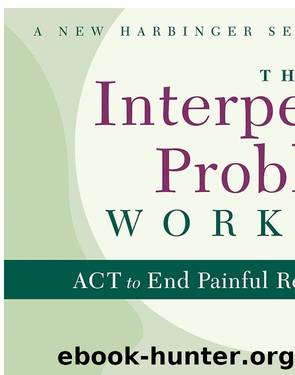Interpersonal Problems Workbook by Matthew McKay & Patrick Fanning & Avigail Lev & Michelle Skeen

Author:Matthew McKay & Patrick Fanning & Avigail Lev & Michelle Skeen
Language: eng
Format: epub
ISBN: 9781608828388
Publisher: New Harbinger Publications, Inc.
Published: 2013-06-13T00:00:00+00:00
How Your Mind Works
Thoughts occur spontaneously. You have little control over their content. You have little control over how often they come up. Schema thoughts are going to pop up from time to time, whatever you do. But if you are trying to act differently in your relationships, according to your newly clarified values, then schema thoughts are absolutely going to pop upâfrequently and vividly. For example, if you are prone to schema thoughts about abandonment and your new friend cancels a date, this minor rejection will be sure to trigger all your old thoughts about people leaving you forever.
To become more aware of how your mind generates these schema thoughts, it helps to think of your mind metaphorically, in terms of real-world objects or experiences that it resembles:
A popcorn machine. Your mind functions like a popcorn machine, popping up thoughts one after another Hayes, Strosahl, and Wilson 1999). Sometimes a whole lot of thoughts pop in rapid succession. Sometimes the rate is slower, with isolated thoughts here and there, separated by brief moments of silence. But your mind never stops entirely. And you canât turn off the popcorn machine of your mind. And you canât speed it up or slow it down. Your mind just keeps popping up thoughts: pop, pop, kernel after kernel. Thatâs how itâs designed. Thatâs how it works.
A tug-of-war fanatic. Your mind loves to play tug-of-war (Hayes, et al. 1999). When schema thoughts come up, itâs as if your mind were handing you one end of a rope and challenging you to a tug-of-war. Trying to resist or argue with your schema thoughts is like grabbing the rope and starting to pull. The harder you pull, the harder your mind pulls back. As you continue to try to refute the schema thought or turn it off, you are digging in your heels and pulling harder and harder on the rope, making your mind also dig in and pull back harder, in the form of more negative judgments, more rotten memories, more dire predictions.
The way out is to let go of the rope. Stop pulling and just drop it. The way to âhandleâ painful schema thoughts is not to âhandleâ them at all; just let them go, even the most painful and disturbing ones. Every effort at control is just picking up the rope and returning to the tug-of-war. When a painful thought occurs, you have a real choice to make about how to respond. You can do one of three things: attempt to suppress or refute the thought, buy into the thought and agree with it, or notice it and let it go. The attempt to suppress or refute the thought is like picking up the rope, while noticing the thought and letting it go is like dropping the rope.
A pushy sales rep. Picture your thoughts as sales representatives (Vuille 2006). Mundane, everyday thoughts are like polite salespeople who offer you something you donât care for very much and then go away quietly if you donât express interest.
Download
This site does not store any files on its server. We only index and link to content provided by other sites. Please contact the content providers to delete copyright contents if any and email us, we'll remove relevant links or contents immediately.
| Codependency | Conflict Management |
| Dating | Divorce |
| Friendship | Interpersonal Relations |
| Love & Loss | Love & Romance |
| Marriage | Mate Seeking |
The 5 Love Languages: The Secret to Love That Lasts by Gary Chapman(9792)
Doing It: Let's Talk About Sex... by Hannah Witton(9277)
Should I Stay or Should I Go? by Ramani Durvasula(7658)
The Road Less Traveled by M. Scott Peck(7594)
The Lost Art of Listening by Michael P. Nichols(7494)
Daring Greatly by Brene Brown(6504)
Beartown by Fredrik Backman(5737)
We Need to Talk by Celeste Headlee(5608)
Men In Love by Nancy Friday(5234)
The Rules Do Not Apply by Ariel Levy(4957)
The State of Affairs by Esther Perel(4712)
How To Win Friends and Influence People by Dale Carnegie(4505)
Reflections Of A Man by Mr. Amari Soul(4288)
Pillow Thoughts by Courtney Peppernell(4272)
The Ethical Slut by Janet W. Hardy(4243)
Algedonic by r.h. Sin(4056)
Surrounded by Idiots by Thomas Erikson(4039)
He's Just Not That Into You by Greg Behrendt & Liz Tuccillo(3891)
I Love You But I Don't Trust You by Mira Kirshenbaum(3868)
